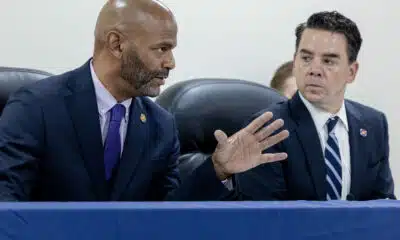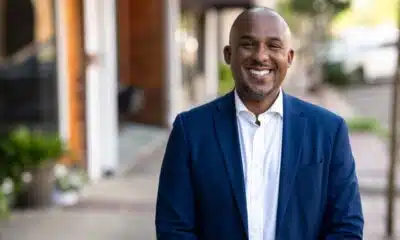Mississippi News
Some leaders ignore health care woes at Hobnob Mississippi
State’s health care woes ignored by some, but not all at annual Hobnob
“Only positive Mississippi spoken here,” a phrase coined by former Gov. Kirk Fordice, was the theme for the most part of the politicians at the annual Hobnob event sponsored by the state’s Economic Council.
But two politicians – Lt. Gov. Delbert Hosemann and Insurance Commissioner Mike Chaney – devoted much of their speech at the Mississippi Economic Council’s annual Hobnob to the state’s troubled health care system and the financial difficulties that many of the state’s hospitals are facing.
“Would you locate (a business) in a state that you don’t have health care?” Chaney asked of the crowd of about 1,000 primarily business leaders gathered at the Mississippi Coliseum to hear from the state’s political leadership. “I don’t think you would.”
Hosemann said the Senate would be looking at health care issues during the upcoming session. He also said the legislative leadership should not be scared away from efforts to improve health care by “that X word.”
Hosemann was presumably referring to Medicaid expansion where, through primarily federal funds, the state could provide health care for about 200,000 poor Mississippians, mostly people who work in jobs that do not offer health insurance. Hospitals have argued that expanding Medicaid like 38 other states have done would help them financially.
At the very least, the lieutenant governor said the state should extend Medicaid coverage for mothers from 60 days after giving birth to one year.
“How can we not be pro-life and pro-child at the same time?” asked Hosemann. “That does not make sense to me.”
While not definitively endorsing Medicaid expansion, Hosemann has said the state should look for the most efficient and inexpensive way to improve health care access in the state. Many argue that expanding Medicaid with the federal government paying most of the costs would be the best way to do that.
Chaney told reporters after the speech he supported Medicaid expansion and that he believes Hosemann does, too. But passing Medicaid expansion will be difficult with both Gov. Tate Reeves and Speaker Philip Gunn in opposition.
Reeves kept his speech positive, not mentioning health care at all.
But after the speech, he reiterated to reporters his opposition to Medicaid expansion.
“I remain opposed to expanding Obamacare in Mississippi …” Reeves said. “No doubt we’ve seen certain health care institutions in our state and across the country struggling, due to leadership decisions that were made in those specific instances. The pandemic certainly didn’t make it any easier.”
Reeves said a solution to Mississippi’s dire health care issues is doing away with the state’s certificate of need (CON) requirements. CON laws regulate approval of major projects or expansions for health care facilities, aiming to control health care costs by reducing duplicative services and restricting where new facilities can be built and operated. Mississippi and 34 other states have varying CON laws.
Reeves said this thwarts competition, and “competition tends to drive down costs.”
“For instance, the University of Mississippi Medical Center doesn’t have to adhere to CON rules, but everyone else does,” Reeves said. “That doesn’t make any sense whatsoever.”
Opponents of removing the CON process say they fear it would result in even fewer hospitals and other health care facilities in poor and underpopulated areas.
On other topics, Reeves said Mississippi is in historically great financial shape and vowed to continue to push to eliminate the state’s personal income tax.
“You have my word that as long as I’m governor I will never stop fighting to fully eliminate the income tax in Mississippi,” Reeves said. He said this will make the state more competitive for economic development with Texas, Florida and Tennessee – states that have no personal income tax.
“Mississippi in virtually every category is climbing the national ladder,” Reeves said. He said the state has seen a record $3.5 billion in capital investment so far this year with “more capital investment in 2022 than we saw in the five years previous to me becoming governor.” He said the state has made great gains in K-12 education, including increasing the graduation rate from 72% to 88.5% during his time in office, now above the national average of 86.5%.
Reeves vowed to push for “good jobs with above-average wages,” and quoted from his first state-of-the-state address: “At the end of my time as governor, we will measure our success in the wages of our workers.”
According to a recent U.S. Census report, Mississippi has the nation’s lowest median household income at $46,511, compared to $67,521 nationally. Mississippi also has the highest poverty rate, with 18.8% of people living at or below the poverty level.
Chaney spent much of his speech criticizing both the University of Mississippi Medical Center and Blue Cross & Blue Shield of Mississippi for their inability to settle their contract dispute, which is impacting tens of thousands of Mississippians. People insured through Blue Cross have been out of network with UMMC since April 1.
“Both parties in this dispute are wrong,” Chaney said. “UMMC is asking for too much, and Blue Cross can give more.”
Chaney later told reporters that he believes the dispute could be settled, though, in the coming days.
Chaney said UMMC is “using (patients) as pawns for a money grab … On the other side Blue Cross is not right, either.”
The Republican insurance commissioner also told the crowd that UMMC has written a letter to a Medicaid managed care company demanding a higher reimbursement rate. If UMMC is not included in the network for the managed care company, this could impact health care for many of the Mississippians covered through Medicaid.
There are three companies – Magnolia, United and Molina – that have managed care contracts with the Mississippi Division of Medicaid. Under the contracts, the companies provide health care services for the Medicaid patients at a set rate paid to them by the state. Under that process, the companies reimburse the health care providers for the services provided to Medicaid recipients.
In response to Chaney’s comments, Dr. Alan Jones, associate vice chancellor for Clinical Affairs told Mississippi Today: “In the course of normal business operations, all health care institutions enter discussions with payor partners about new or current contracts, sometimes several months before the end of a current agreement. These routine engagements are necessary to ensure contracts meet the needs of our patients who are their health plan members.
He added, “Currently, we are in normal contract-related discussions with Magnolia Health Plan on the agreement that covers UMMC care provided to their managed Medicaid health plan members. Our intent is that these standardized discussions will soon yield a new agreement and we will continue our strong partnership with Magnolia and health care relationship with their members.”
Chaney also predicted that efforts to negotiate a lease agreement between the Greenwood LeFlore Hospital and UMMC would be unsuccessful and that the financially troubled hospital would close, negatively impacting health care throughout the Delta.
Chaney said the state’s health care issues must be solved if the state is to prosper.
Also speaking were Auditor Shad White, Secretary of State Michael Watson, Attorney General Lynn Fitch, House Speaker Philip Gunn, Agriculture and Commerce Commissioner Andy Gipson and Treasurer David McRae.
Gipson, wearing his cowboy hat, sang a portion of the song “A Country Boy Can Survive” before praising the work of Mississippi farmers.
Watson, who has been mentioned as a possible gubernatorial candidate at some point – perhaps even against Reeves in the 2023 Republican primary – said, of next year’s election, “We need leaders who care more about Mississippi than their careers. I hope you help me elect those folks.”
While not being specific, Watson referenced some “tough times” possibly ahead for the state in terms of health care.
White said that as auditor, he gets to “look under the hood of Mississippi government,” and see what works and what doesn’t. He said the state’s workforce is the biggest issue he sees, and he offered four ideas to improve it.
“First, an earned income tax credit,” White said. “If you go from unemployed to employed, you get a tax cut … 29 other states have this … It’s one of the best things to get people off the couch and off the sidelines and working … There are some folks who want to just hand a bunch of money to poor people. That is not going to juice our economy.”
White said the state should use its federal Temporary Assistance for Needy Families money – the source of a major fraud and misspending case White’s office uncovered – to fund the tax credits, as 20 other states do.
“Second, we’ve got to address brain drain,” White said. “From 2015-2019 we spent $1.5 to $2 billion on higher education, and we only kept 50% of the graduates in Mississippi.”
White said his office has a fellowship program that helps cover tuition for future auditors, provided they stay with his office for two years. He said this could be replicated for other professions statewide.
“Third, fatherlessness,” White said. He said too many children are growing up in broken homes and are not prepared to succeed when they become adults. He said, “There are all sorts of social maladies from not having engaged fathers in the home.” White said the Junior ROTC program in Jackson Public Schools is an example of a program that helps with this issue – with retired military people mentoring youth. He said the program at JPS has a “100% graduation rate.”
Fourth, White said, “is the city of Jackson.”
“Jackson is our number-one talent magnet in this state,” White said, “with 30% of our graduates coming to work in Hinds County.”
He said, “Jackson’s magnet is going to turn off unless we learn how to collect the garbage, keep the water clean and not be the per-capita homicide leader in the country.”
This article first appeared on Mississippi Today and is republished here under a Creative Commons license.
Mississippi News
Suspect in Charlie Kirk killing is charged with murder as prosecutor says DNA found on rifle trigger
SUMMARY: Tyler Robinson, 22, was charged with the murder of conservative figure Charlie Kirk, shot Sept. 10 at Utah Valley University. Robinson confessed via text to his partner and left a note expressing intent to kill Kirk, citing hatred. DNA linked Robinson to the rifle used. Prosecutors revealed Robinson planned the attack for over a week and targeted Kirk, a key conservative youth leader. Robinson’s political views shifted after dating a transgender man, causing family tensions. After the shooting, Robinson discarded evidence and urged his partner to delete texts. FBI investigates possible wider connections. Charges include murder with potential death penalty enhancements.
Read the full article
The post Suspect in Charlie Kirk killing is charged with murder as prosecutor says DNA found on rifle trigger appeared first on www.wjtv.com
Mississippi News
Suspect in Charlie Kirk assassination believed to have acted alone, says Utah governor
SUMMARY: Tyler Robinson, 22, was arrested for the targeted assassination of conservative activist Charlie Kirk in Orem, Utah. Authorities said Robinson had expressed opposition to Kirk’s views and indicated responsibility after the shooting. The attack occurred during a Turning Point USA event at Utah Valley University, where Kirk was shot once from a rooftop and later died in hospital. Engravings on bullets and chat messages helped link Robinson to the crime, which was captured on grim video. The killing sparked bipartisan condemnation amid rising political violence. President Trump announced Robinson’s arrest and plans to award Kirk the Presidential Medal of Freedom.
The post Suspect in Charlie Kirk assassination believed to have acted alone, says Utah governor appeared first on www.wjtv.com
Mississippi News
Americans mark the 24th anniversary of the 9/11 attacks with emotional ceremonies
SUMMARY: On the 24th anniversary of the 9/11 attacks, solemn ceremonies were held in New York, at the Pentagon, and in Shanksville to honor nearly 3,000 victims. Families shared personal remembrances, emphasizing ongoing grief and the importance of remembrance. Vice President JD Vance postponed his attendance to visit a recently assassinated activist’s family, adding tension to the day. President Trump spoke at the Pentagon, pledging never to forget and awarding the Presidential Medal of Freedom posthumously. The attacks’ global impact reshaped U.S. policy, leading to wars and extensive health care costs for victims. Efforts continue to finalize legal proceedings against the alleged plot mastermind.
The post Americans mark the 24th anniversary of the 9/11 attacks with emotional ceremonies appeared first on www.wcbi.com
-
News from the South - North Carolina News Feed6 days ago
What we know about Charlie Kirk shooting suspect, how he was caught
-
News from the South - North Carolina News Feed6 days ago
Federal hate crime charge sought in Charlotte stabbing | North Carolina
-
Our Mississippi Home5 days ago
Screech Owls – Small but Cute
-
News from the South - Arkansas News Feed6 days ago
NW Arkansas Championship expected to bring money to Rogers
-
News from the South - Alabama News Feed7 days ago
Huntsville Fire & Rescue Holds 9/11 Memorial Service | Sept. 11, 2025 | News 19 at 5 p.m.
-
News from the South - North Carolina News Feed6 days ago
Under pressure, some immigrants are leaving American dreams behind
-
Mississippi News Video6 days ago
Mississippi Science Fest showcases STEAM events, activities
-
News from the South - Tennessee News Feed6 days ago
What to know about Trump’s National Guard deployment to Memphis



















































